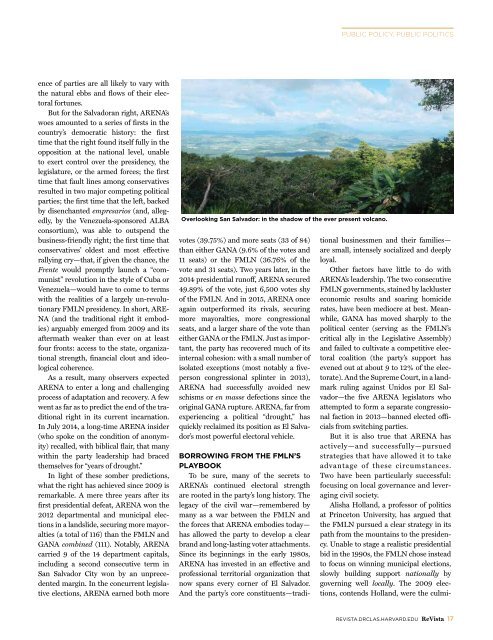EL SALVADOR
8clowSgZh
8clowSgZh
You also want an ePaper? Increase the reach of your titles
YUMPU automatically turns print PDFs into web optimized ePapers that Google loves.
PUBLIC POLICY, PUBLIC POLITICS<br />
ence of parties are all likely to vary with<br />
the natural ebbs and flows of their electoral<br />
fortunes.<br />
But for the Salvadoran right, ARENA’s<br />
woes amounted to a series of firsts in the<br />
country’s democratic history: the first<br />
time that the right found itself fully in the<br />
opposition at the national level, unable<br />
to exert control over the presidency, the<br />
legislature, or the armed forces; the first<br />
time that fault lines among conservatives<br />
resulted in two major competing political<br />
parties; the first time that the left, backed<br />
by disenchanted empresarios (and, allegedly,<br />
by the Venezuela-sponsored ALBA<br />
consortium), was able to outspend the<br />
business-friendly right; the first time that<br />
conservatives’ oldest and most effective<br />
rallying cry—that, if given the chance, the<br />
Frente would promptly launch a “communist”<br />
revolution in the style of Cuba or<br />
Venezuela—would have to come to terms<br />
with the realities of a largely un-revolutionary<br />
FMLN presidency. In short, ARE-<br />
NA (and the traditional right it embodies)<br />
arguably emerged from 2009 and its<br />
aftermath weaker than ever on at least<br />
four fronts: access to the state, organizational<br />
strength, financial clout and ideological<br />
coherence.<br />
As a result, many observers expected<br />
ARENA to enter a long and challenging<br />
process of adaptation and recovery. A few<br />
went as far as to predict the end of the traditional<br />
right in its current incarnation.<br />
In July 2014, a long-time ARENA insider<br />
(who spoke on the condition of anonymity)<br />
recalled, with biblical flair, that many<br />
within the party leadership had braced<br />
themselves for “years of drought.”<br />
In light of these somber predictions,<br />
what the right has achieved since 2009 is<br />
remarkable. A mere three years after its<br />
first presidential defeat, ARENA won the<br />
2012 departmental and municipal elections<br />
in a landslide, securing more mayoralties<br />
(a total of 116) than the FMLN and<br />
GANA combined (111). Notably, ARENA<br />
carried 9 of the 14 department capitals,<br />
including a second consecutive term in<br />
San Salvador City won by an unprecedented<br />
margin. In the concurrent legislative<br />
elections, ARENA earned both more<br />
Overlooking San Salvador: in the shadow of the ever present volcano.<br />
votes (39.75%) and more seats (33 of 84)<br />
than either GANA (9.6% of the votes and<br />
11 seats) or the FMLN (36.76% of the<br />
vote and 31 seats). Two years later, in the<br />
2014 presidential runoff, ARENA secured<br />
49.89% of the vote, just 6,500 votes shy<br />
of the FMLN. And in 2015, ARENA once<br />
again outperformed its rivals, securing<br />
more mayoralties, more congressional<br />
seats, and a larger share of the vote than<br />
either GANA or the FMLN. Just as important,<br />
the party has recovered much of its<br />
internal cohesion: with a small number of<br />
isolated exceptions (most notably a fiveperson<br />
congressional splinter in 2013),<br />
ARENA had successfully avoided new<br />
schisms or en masse defections since the<br />
original GANA rupture. ARENA, far from<br />
experiencing a political “drought,” has<br />
quickly reclaimed its position as El Salvador’s<br />
most powerful electoral vehicle.<br />
BORROWING FROM THE FMLN’S<br />
PLAYBOOK<br />
To be sure, many of the secrets to<br />
ARENA’s continued electoral strength<br />
are rooted in the party’s long history. The<br />
legacy of the civil war—remembered by<br />
many as a war between the FMLN and<br />
the forces that ARENA embodies today—<br />
has allowed the party to develop a clear<br />
brand and long-lasting voter attachments.<br />
Since its beginnings in the early 1980s,<br />
ARENA has invested in an effective and<br />
professional territorial organization that<br />
now spans every corner of El Salvador.<br />
And the party’s core constituents—traditional<br />
businessmen and their families—<br />
are small, intensely socialized and deeply<br />
loyal.<br />
Other factors have little to do with<br />
ARENA’s leadership. The two consecutive<br />
FMLN governments, stained by lackluster<br />
economic results and soaring homicide<br />
rates, have been mediocre at best. Meanwhile,<br />
GANA has moved sharply to the<br />
political center (serving as the FMLN’s<br />
critical ally in the Legislative Assembly)<br />
and failed to cultivate a competitive electoral<br />
coalition (the party’s support has<br />
evened out at about 9 to 12% of the electorate).<br />
And the Supreme Court, in a landmark<br />
ruling against Unidos por El Salvador—the<br />
five ARENA legislators who<br />
attempted to form a separate congressional<br />
faction in 2013—banned elected officials<br />
from switching parties.<br />
But it is also true that ARENA has<br />
actively—and successfully—pursued<br />
strategies that have allowed it to take<br />
advantage of these circumstances.<br />
Two have been particularly successful:<br />
focusing on local governance and leveraging<br />
civil society.<br />
Alisha Holland, a professor of politics<br />
at Princeton University, has argued that<br />
the FMLN pursued a clear strategy in its<br />
path from the mountains to the presidency.<br />
Unable to stage a realistic presidential<br />
bid in the 1990s, the FMLN chose instead<br />
to focus on winning municipal elections,<br />
slowly building support nationally by<br />
governing well locally. The 2009 elections,<br />
contends Holland, were the culmi-<br />
REVISTA.DRCLAS.HARVARD.EDU ReVista 17


